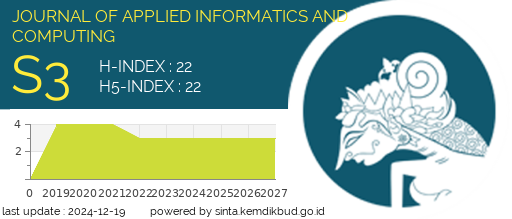Analytic Training Game to Increase Inductive Thinking for Junior High School Students using Speech Recognition
DOI:
https://doi.org/10.30871/jaic.v4i1.2042Keywords:
Android, Analytical Thinking, Game Analysis Training, Speech RecognitionAbstract
Inductive reasoning is a way to take general conclusions from individual cases. Mathematical reasoning is one of the main abilities that needs to have. Through human reason, humans continue to develop and improve their ability to adapt on dynamic environment and create technologies that can facilitate their lives. Based on direct interviews with the YKPP Junior High School Mathematics Teacher, revealed that there are still many students who are still not good in the ability to think inductively, and if this ability is not trained, it will affect the child's academic value, especially in mathematics. Then based on the results of direct interviews with clinical psychologists, solutions are prepared using the IST and IRT forms to be able to practice the ability to think inductively in children aged 12-15 years which age is in accordance with the range of junior high school age children. Many learning media developed at this time as supporters of conventional learning media. Learning methods with Educational Game media are believed more better compared to conventional learning methods. Therefore, Game Analysis Training has been made using the IST and IRT forms, which can help students improve their ability to think inductively. The material used in this game has passed validation test by Dra. Erni Yulial S. Psi, who is a clinical psychologist in Pekanbaru City. This statement is assisted by the results of pre-test and post-test that have been done, where an increase in the results of post-test conducted with the percentage of correctly is 13.8% for the Intelligenz Structure Test form and 8.28% for the Inductive Reasoning Test form.
Downloads
References
Teorema, J. T. (2017). TEOREMA. Analisis Kemampuan Berpikir nalar matematis serta kontribusinya terhadap prestasi belajar, 55.
Dra. Erni Yulial, S. P., & Kasmawati, S. (2019, February). Wawancara Langsung Psikolog Klinis dan Guru Matematika. (H. Sasmita, Interviewer)
Trisnadoli, A. (2015). Analisis Kebutuhan Kualitas Perangkat Lunak pada Software berbasis Mobile.
Kuswardayan, dkk. (2016). Rancang Bangun Game Berhitung Spaceship dengan Pengendali Suara Menggunakan Speech Recognition Plugin pada Unity.
Jaya, M., T., S., & Puspitaningrum, D., & Susilo, B. (2016). Penerapan speech recognition pada permainan teka-teki silang menggunakan metode Hidden Markov Model (HMM) berbasis desktop. Bengkulu: Universitas Bengkulu.
Raymond. (2017). Pembangunan Game Memory Training terhadap Peningkatan Short Term Memory (STM) pada Anak SMP Menggunakan Speech Recognition (Studi Kasus: SMP Dharma Loka Pekanbaru).
Adrian H. O. (2018). Pembangunan Game Analysis Training terhadap Peningkatan Kemampuan Analisa Soal pada Anak SMP Menggunakan Speech Recognition (Studi Kasus: SMP Metta Maitreya).
Novayani, W. (2019). Game Genre untuk Permainan Pembelajaran Sejarah Berdasarkan Kebutuhan Pedagogi dan Learning Content. Jurnal Politeknik Caltex Riau, 54-63.
Taufik Hidayat, M. M. (2018). Pengujian Sistem Informasi Pendaftaran dan Pembayaran Wisuda Online menggunakan Black Box Testing dengan Metode Equivalence Partitioning dan Boundary Value Analysis. Jurnal Teknik Informatika UNIS.
Suryani, Y. E. (2018). Aplikasi Rasch Model dalam mengevaluasi Intelligenz Structure Test (IST). Psikohumaniora: Jurnal Penelitian Psikologi, 73 "“ 100
Herdianto. (2012). Penerapan Speech Recognition Library Untuk Query Basis Data. Academia, 1-12.
Downloads
Published
How to Cite
Issue
Section
License
Copyright (c) 2020 Heri Sasmita, Wenda Novayani

This work is licensed under a Creative Commons Attribution-ShareAlike 4.0 International License.
Authors who publish with this journal agree to the following terms:
- Authors retain copyright and grant the journal right of first publication with the work simultaneously licensed under a Creative Commons Attribution License (Attribution-ShareAlike 4.0 International (CC BY-SA 4.0) ) that allows others to share the work with an acknowledgement of the work's authorship and initial publication in this journal.
- Authors are able to enter into separate, additional contractual arrangements for the non-exclusive distribution of the journal's published version of the work (e.g., post it to an institutional repository or publish it in a book), with an acknowledgement of its initial publication in this journal.
- Authors are permitted and encouraged to post their work online (e.g., in institutional repositories or on their website) prior to and during the submission process, as it can lead to productive exchanges, as well as earlier and greater citation of published work (See The Effect of Open Access).











